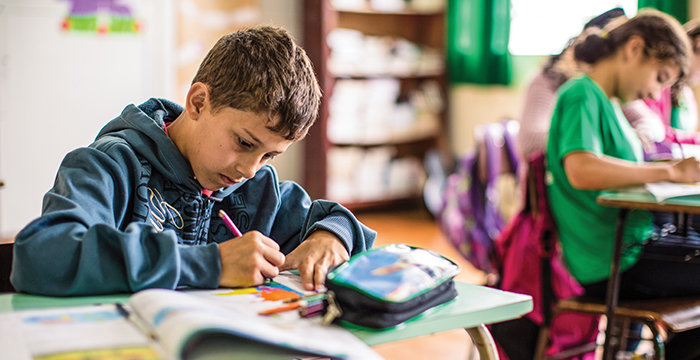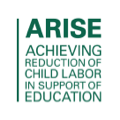What we do
Collaborative & community-based
Working closely with communities is crucial to the ARISE program’s success. It offers an opportunity not just for children to gain an education, but also for societies to become more self-reliant.
Education is at the heart of everything we do, but in order to address the root causes of child labor and change the mindset of communities engaging in child labor, it is essential for ARISE to be on the ground, working with the people directly affected and with others who also have the power to change things.
Where we focus our efforts
Our initiatives focus on three core drivers for change that stimulate new thinking, behaviour, and traditions that improve the quality of education, provide economic opportunities that empower families and strengthen regulatory frameworks.
1. Improving quality education & raising awareness
ARISE works with communities that have a strong cultural heritage of children working alongside adults. This involves raising awareness of the detrimental effects of child labor, helping to change damaging cultural habits, promoting education, and helping to improve access to education and school infrastructures.
Our activities include:
- Parenting education with a focus on child labor
- Early childhood education
- Improving school learning environments
- Family Support Scholarships
- Awareness campaigns
- Complimentary basic education
- Vocational training
- Anti-child labor clubs
- After-school programs and activities
- Education and school-relevant infrastructure
2. Strengthening economic opportunities
ARISE aims to improve the income-earning potential and long-term livelihoods of farmers, their families, and their communities to greatly reduce poverty, which is a key underlying cause of child labor. This involves helping farmers to improve agricultural productivity, crop quality, and working conditions, providing training and improving the living conditions of communities.
Our activities include:
- Conditional grant distribution
- Income-generating activities
- Model Farm Schools
- Village Savings and Loans
- Birth registration
- Youth clubs
- Developing and promoting market access
- Training and capacity building
- Provision of school meals/school health or nutrition
- Women agribusiness groups
- Women’s economic empowerment
3. Improving legal and regulatory frameworks
ARISE proactively cooperates with governments (at national and local levels) and other international organizations to help improve legal and regulatory frameworks. Efforts are aimed towards tailored and effective laws that address child labor issues, helping to achieve greater transparency in the market structure and supply chains as well as supporting the adequate enforcement of regulation.
Our activities include:
- Strengthen the capacity of government
- Support advocacy for improved legislation
- Training workshops
- Support for the review of the National Action Plan on child labor
- Lobbying for anti-child labor policy
Find out more about our efforts to advocate for improved legal and regulatory frameworks.
Program management
Representatives in the countries where we grow our tobacco leaves are now responsible for managing local partnerships, assessing projects, and implementing local activities. Country representatives have full ownership of local ARISE programs, from design to implementation. This approach allows us to maximize efficiency, strengthen our relationship with growers, and harmonize the program with other relevant community projects.
Monitoring our impact
To make sure that ARISE initiatives stay on track and deliver agreed objectives, clear benchmarks and deliverables have been established. We regularly monitor and internally report on our progress.
ARISE and the Sustainable Development Goals
These core efforts also contribute to the achievement of the UN Sustainable Development Goals (SDGs), specifically:
- SDG 4 Quality Education
- SDG 8 Decent Work and Economic Growth,
- SDG 16 Partnerships for the Goals.
Our initiatives are interconnected and as such also contribute to other SDGs such as:
- SDG 1 No Poverty via our Village Savings and Loans Association training which increases access to finance and household income
- SDG 2 Zero Hunger via our Model Farm Schools and School Feeding Programs which address food security
- SDG 5 Gender Equality via opening access to education for girls and our Income Generating Activities for mothers which reduces income earning inequality
- SDG 6 Clean Water & Sanitation via our boreholes and toilet facilities at schools
- SDG7 Affordable Clean Energy via our solar power systems in school gardens
- SDG 13 Climate Action via our cookstove projects that reduce the need for wood fuel stoves and deforestation
- SDG 15 Life on Land via our Model Farms School and deforestation competitions which teach and agroforestry and environmental conversation.




